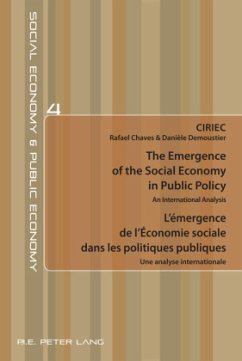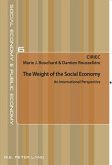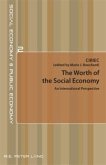There is growing international recognition of the importance of the social economy, consisting of cooperatives, mutuals and non-profit organizations. The Social Economy provides resilience in financial crises, choice in a plural economy, greater social capital and the means for development of a more democratic and inclusive civil society. But questions remain: how best develop policies and institutions to exploit this potential? What policies have emerged? And why have they emerged in some countries and not in others? This book presents work undertaken by experts and policymakers from Europe, America and Asia under the auspices of CIRIEC's International Scientific Commission on "Social and Cooperative Economy". After a general analysis of public policies concerning the social economy, its key features, objectives and pattern of evolution, the book provides a supranational and international approach from both a European perspective (examining the policies of European bodies) and aSouth American perspective. This is followed by a number of national and regional analyses. The book concludes by examining the evolution, divergence and convergence of the social economy and its integration in public policy.
Face à la crise, coopératives, mutuelles et associations tentent de créer du capital social et de construire une société plus démocratique et inclusive. L'Économie sociale serait-elle enfin entrée dans l'agenda politique des gouvernements ? Une vague de nouvelles lois et projets de lois d'économie sociale semblent le confirmer. Pourquoi ces politiques ont-elles émergé dans certains pays et non d'autres ? Quelles ont été leurs portée et limites ? Chercheurs et experts d'Europe, d'Amérique et d'Asie ont travaillé sous les auspices de la Commission scientifique internationale " Économie sociale et coopérative " du CIRIEC pour dresser un premier bilan international de ces questions. Cet ouvrage propose dans un premier temps une analyse générale des politiquespubliques en faveur de l'Économie sociale, à la fois dans leur construction, leurs modalités, leurs objectifs et leurs évolutions. L'analyse se place ensuite dans une double perspective européenne (par l'examen des politiques des instances européennes) et latino-américaine. Enfin, des analyses nationales et régionales visent à mettre en exergue les spécificités historiques et institutionnelles.
Face à la crise, coopératives, mutuelles et associations tentent de créer du capital social et de construire une société plus démocratique et inclusive. L'Économie sociale serait-elle enfin entrée dans l'agenda politique des gouvernements ? Une vague de nouvelles lois et projets de lois d'économie sociale semblent le confirmer. Pourquoi ces politiques ont-elles émergé dans certains pays et non d'autres ? Quelles ont été leurs portée et limites ? Chercheurs et experts d'Europe, d'Amérique et d'Asie ont travaillé sous les auspices de la Commission scientifique internationale " Économie sociale et coopérative " du CIRIEC pour dresser un premier bilan international de ces questions. Cet ouvrage propose dans un premier temps une analyse générale des politiquespubliques en faveur de l'Économie sociale, à la fois dans leur construction, leurs modalités, leurs objectifs et leurs évolutions. L'analyse se place ensuite dans une double perspective européenne (par l'examen des politiques des instances européennes) et latino-américaine. Enfin, des analyses nationales et régionales visent à mettre en exergue les spécificités historiques et institutionnelles.








